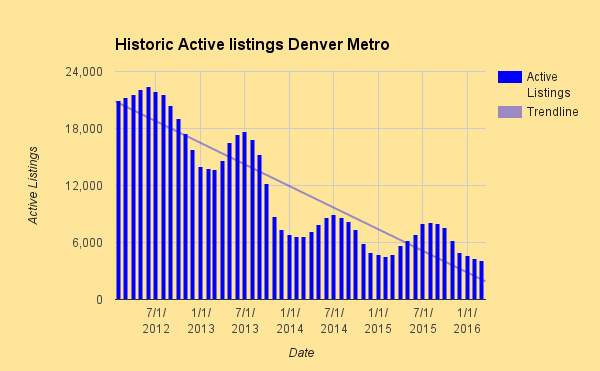Fall of 2015 was filled with speculation and uncertainty about Fed rate increases. How much would they increase and how would the hike affect mortgage rates and the economy? The Fed did raise rates and mortgage rates also increased slightly, but since that time mortgage rates have dropped again. (There are now many options at or below 4%). These low mortgage rates have an effect on housing and the economy nationally, but have a particularly large impact in a strong housing market like Denver.
Low inventory + Low Rates = Seller’s market again
As you can see in the chart below, Denver real estate inventory continues to hit new year over year lows for active listings. This alarmingly low inventory along with low mortgage rates mean prices will continue to escalate during the spring and summer buying season. The largest home price gains in Denver often occur from March through June when buyers are out in the greatest numbers.
Overall sellers will continue to have a large advantage with the ability to dictate terms and push new price highs. Buyers and sellers should also be aware that the time on market and demand varies within the Denver metro area based on price range and location. This means that some price ranges and areas sell much faster than others. Knowing which your home fits into is important.

Payment Not Price!
The large increase in prices for homes in the Denver area over the last few years has many concerned about a housing bubble and the sustainability of the market. Many of us who have lived in Denver for years have the perception that home prices are now unaffordable, but monthly payments are actually a more accurate measure of affordability. While home prices have substantially increased, the biggest determination for many buyers who want to purchase a home is actually monthly mortgage payment rather than the price of the home.
With rental rates at historic highs, an unemployment rate of 3.1% in Denver for December (according to Metro Denver Economic Corporation) and large population increases expected to continue for decades, many are rushing to take advantage of the low rates and payments that are often lower than rent. Buying now in order to take advantage of lower payments will continue to accelerate price increases especially in homes priced under $500,000.
The Equity Opportunity
The largest percentage increase in home prices has been in Denver area homes priced under $500,000. Many of these homeowners are realizing that they have increased financial leverage to help purchase their dream home, or long-term home, now. With rates still hovering around historic lows expect to see many homeowners looking to make the leap into a higher price range and take advantage of the stronger equity position they have gained over the last four years.
Conforming loans amounts have also increased in Denver for 2016. Many homebuyers have increased flexibility for higher priced homes thanks in part to the increase in conforming loan amounts to $458,850 for 2016 for Denver and most of the surrounding areas. Even jumbo mortgage rates (for mortgages over $458,850 in Denver) are reaching historic lows and are easier to obtain than in recent years.
These low rate options, combined with increased equity, will likely encourage many homeowners to consider that higher price range. As a result, homes priced in the $500,000 to $1 million range will start to experience larger price increases as well.
Luxury Rising
The Denver luxury real estate market has seen increasing strength over the last year and that trend will likely continue. Although a relatively large percentage of luxury home sales are in cash there are still many financed properties. Jumbo and super-jumbo mortgage options are becoming more widely available again and many buyers are taking advantage of exceptionally low interest rates.
Many affluent buyers are taking advantage of this increased financial leverage to buy their Denver dream home. Homes priced from $1 million to $3 million will likely continue to see the biggest increases, but expect the luxury market as a whole to increase in the Denver area.
Higher Rates? Lock it down
Many believe that higher rates, prompted by the Fed increase, could lead to a slowdown in housing appreciation. The more likely effect for Denver real estate will be a quick acceleration of prices as people try to lock in the lower payments. Even if rates rise it will most likely only change the price range for buyers and make them even more willing to pay higher prices to own at a fixed payment.
Interest Rate Outlook & Denver
Although interest rates may rise over time, the increases are likely to be small and gradual. The U.S. and international economies are still cautious about potential weakness and a global slowdown. Low rates are helping to sustain much of the growth throughout the U.S. and international instability leads many international investors to seek the perceived safety of U.S. treasuries and that will keep borrowing rates low.
The bottom line is that now is still a good time to buy a home in Denver. Sustained low interest rates, low inventory and the strength of Denver’s economy mean that housing demands will remain strong for the next few years at least.
Want to learn more about your price range, neighborhood and options? Contact a reliable Denver real estate agent today.





